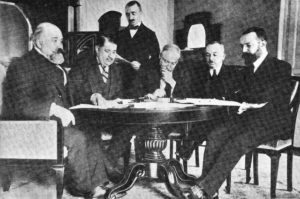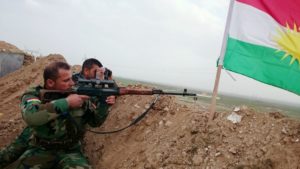
Stanislav Tarasov – Erdogan is not Ataturk, but Putin is not Lenin
March 4, 2020 – Stanislav Tarasov, Editor-in-chief of the Eastern edition:

The unexpected resilience of Syrian President Bashar al-Assad was a blow to Erdogan’s plans to expand his international influence. After the “Arab Spring”, the Turkish president dreamed of becoming the leader of the Sunni world, relying on the Muslim Brotherhood (an organization whose activities are banned in the Russian Federation), but now has to save the country from turmoil and possible split.
At the height of the Idlib crisis, Turkish President Recep Tayyip Erdogan made an appeal on Twitter. According to him, now “there is a historical struggle for Turkey today and tomorrow” and “the current processes in the region are no less significant for Turkey in their scope and consequences than those through which it went about a hundred years ago – during the period of national liberation struggle under the leadership of Mustafa Kemal Ataturk. ” At the same time, he achieved that “throughout the whole history the region in which our country is located has faced the threat of seizure”, and “we will not forget about any betrayal either.”
Erdogan’s appeal to the historical facts of Ataturk’s times, to put it mildly, is incorrect if only because, firstly, Ataturk fought on his territory, and Erdogan conducts military operations on the lands of neighboring states, in particular Iraq and Syria, also sent military units and to Libya. Secondly, Ataturk waged an armed struggle against the Sultan and the interventionists.
Today in Turkey there is no Sultan and no one shows intentions to occupy it. Thirdly, Ataturk carried out modernization of the country according to European patterns and really created a new state. Erdogan is also modernizing Turkey, but using the tools of the so-called “soft Islam”, leading along the typical imperial path of development, actually introducing the idea of historical revenge, restoration of influence at least within the borders of the former Ottoman Empire. But the most important thing is that Erdogan declares Ataturk and his associates almost national traitors.
Speaking at a ceremony commemorating the 79th anniversary of the death of Ataturk, the president said: “Turkey was unable to defend its borders at the beginning of the national liberation struggle. The main reason for the threats emerging on the southern borders of Turkey is the departure from the goals of the liberation struggle. If this were not the case, Turkey would today be on a completely different level.
The forces that made Turkey move away from the borders of the times of the liberation struggle are trying today to force Ankara to return to the conditions of the Treaty of Sevres. ” Earlier, in the fall of 2016, he called for a review of the 1923 Lausanne Treaty, which formalized the collapse of the Ottoman Empire, when Turkey lost control of the provinces that were once part of the Ottoman Empire, including Arabia, Egypt, Sudan, Tripolitania, Transjordan, Palestine, Lebanon, Syria, islands in the Aegean and Mesopotamia.

At the same time, there is something in common between Ataturk and Erdogan. Ataturk in his struggle relied on the forces of inner Anatolia, as Erdogan does today. But, Stratfor writes, the paradox is that for Atatürk, conservative Anatolia became a pillar for the “European leap,” and today Anatolia also supports Erdogan in his quest to return the Ottoman civilizational identity. Kemalism, which declared all citizens of the country as Turks, managed to maintain the current borders of the country.
The ideology of “neo-Ottomanism” pursued by Erdogan, by definition, leads to the rejection of the principles of Turkism and Pan-Turkism, which jeopardizes at least the current territorial-administrative arrangement of the country. It is clear that we are talking primarily about Turkish Kurds. Ataturk, an unrivaled authority in Turkey, broke the country through his knee.
Charismatic Erdogan does the same, introducing his principles and ideas, sharpening contradictions both with supporters of laicism (secular development of the country) and with Kurds, who are now fighting for the creation of their own state, which dramatically changes the situation.
According to the American publication The National Interest, “Turkey was introduced in the era of turmoil,” when the West openly discusses the scenario of the collapse of Turkey into a “secular West” and “Islamic East”. It is alleged that Ankara was deliberately drawn into the events of the “Arab spring” and the Syrian crisis, designating only one of the plots of the upcoming redistribution of the Middle East. In our opinion, not everything is simple and unambiguous with the causes of the Idlib crisis, one of the consequences of which could be the transfer of hostilities to the east of Turkey – to Anatolia. Perhaps then Erdogan, like Ataturk once, will start a new “national liberation war” from here. And this is no longer fiction. Although, of course, in the current reality it is difficult to predict the further development of events in Syria, Iraq, and in Turkey.
It is no accident that now they are again recalling a new map of the Middle East, published back in 2013 in The New York Times by the American scientist of the United States Institute of Peace, Robin Wright. He believed that the result of the “Arab spring” should be the emergence of 14 states out of the five existing ones – according to the number of really existing “powerful nationalisms” that were engulfed by the “maelstrom of the civil war”.
In addition, Wright remarked, “interfaith confrontation leads to a split between Sunnis and Shiites on a scale that the modern Middle East has not yet seen.” A well-known French orientalist, a retired senior French intelligence officer Alain Rodier states that “Erdogan is seriously afraid of the emergence of an independent Kurdistan in Syria along the Turkish border,” that “this could serve as a rear base for separatist Kurdish movements from southeast Turkey,” and “ pays no attention to what the international community might think of him. ”

“One cannot fail to admit that Assad’s unexpected resilience was a blow to Erdogan’s plans to expand international influence,” says Rodier. “After the Arab Spring, he dreamed of becoming the leader of the Sunni world, relying on the Muslim Brotherhood (an organization whose activities are banned in the Russian Federation), and now is forced to save the country from a split.”
Moscow should be ready for the expected course of events, not only politically and politically. Erdogan’s emergency talks with Russian President Vladimir Putin are due to take place in the Kremlin on March 5. Erdogan is not Ataturk, and Putin is not Lenin, although the Turks have high hopes for Russia. Erdogan is reaping what he has sowed, but the intrigue is whether Russia will be an occasion for joy and political triumph.
March 4, 2020
Stanislav Tarasov
regnum.ru/news/polit/2874711.html
ENGLISH TRANSLATION “lousavor avedis”
